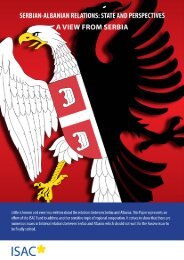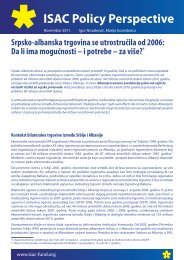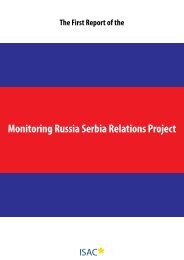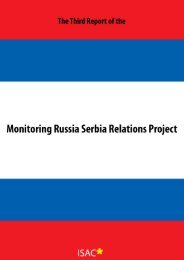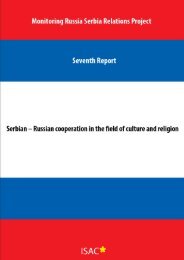the process of security sector reform - ISAC Fund
the process of security sector reform - ISAC Fund
the process of security sector reform - ISAC Fund
Create successful ePaper yourself
Turn your PDF publications into a flip-book with our unique Google optimized e-Paper software.
Robert S. Tomasovic PEACE KEEPING MISSIONS<br />
Robert S. Tomasovic PEACE KEEPING MISSIONS<br />
• Factional Political Groupings & Leadership<br />
• State Infrastructure broken down<br />
• Judicial & Police Breakdown<br />
• Military factions & Warlords<br />
• Weapons proliferation<br />
• There is no rule <strong>of</strong> law, and no rules<br />
• Intermingled with Populations<br />
• Full Range <strong>of</strong> Civilian Agencies / NGOs<br />
United Nations Secretaré-General K<strong>of</strong>i Annan in 1998 stated: “Traditional<br />
peacekeeping operations <strong>of</strong> <strong>the</strong> kind deployed during <strong>the</strong> Cold War are unlikely<br />
to be repeated. Peacekeeping today requires not only rethinking <strong>the</strong> means but<br />
also <strong>the</strong> methods <strong>of</strong> implementing mandates set out by <strong>the</strong> Security Council.”<br />
more, <strong>the</strong> record now shows that UN operations are only one part <strong>of</strong> <strong>the</strong> spectrum<br />
<strong>of</strong> activities under <strong>the</strong> broad peacekeeping banner. Peacekeeping missions (or,<br />
to use <strong>the</strong> more exact term explained below, “peace operations”) <strong>of</strong>fer flexible,<br />
low-key, low-cost, options for <strong>the</strong> pursuit <strong>of</strong> national <strong>security</strong> and foreign policy<br />
interests. They are hardly a panacea for <strong>the</strong> problems <strong>of</strong> <strong>the</strong> planet, but that<br />
does not make individual peace operations inconsequential or ineffectual. To <strong>the</strong><br />
contrary, when it comes to ameliorating suffering, establishing order, promoting<br />
negotiations and reconciliation, and accomplishing sundry associated goals,<br />
peace operations can be among a policymaker’s most effective instruments”.<br />
Peacekeeping is a collective responsibility <strong>of</strong> member states <strong>of</strong> <strong>the</strong> United Nations<br />
as a means to contribute to collective <strong>security</strong> and a means <strong>of</strong> pursuing national<br />
<strong>security</strong> and foreign policy interests. It also represents a specific and unique tool<br />
available to <strong>the</strong> international community to help resolve international conflicts,<br />
and prevent internal wars from destabilizing regions.<br />
These are <strong>the</strong> nine significant changes for military forces in modern peacekeeping<br />
operations:<br />
• Chapter VII Operations will be <strong>the</strong> norm<br />
• Multi-dimensional, mMulti-national operations<br />
• Multi-national forces / coalitions <strong>of</strong> <strong>the</strong> willing will start up peace support<br />
operations<br />
• Focus on integrated political, economic and social solutions<br />
• Integration <strong>of</strong> tasks under one mandate<br />
• Full range <strong>of</strong> civilian intervention<br />
• New coordination mechanism<br />
• Broader range <strong>of</strong> military tasks<br />
• Complementary roles for components<br />
The costs <strong>of</strong> peacekeeping are tiny compared to <strong>the</strong> costs <strong>of</strong> conflict and its<br />
toll in lives and property. Although UN peacekeeping cost about $2.6 billion in<br />
2002, in <strong>the</strong> same year governments worldwide spent $794 billion on arms - a<br />
figure representing 2.5 per cent <strong>of</strong> world gross domestic product. The United<br />
States Institute <strong>of</strong> Peacekeeping, June 19996, defined <strong>the</strong> period <strong>of</strong> modern Peace<br />
Operations as: “Peacekeeping is a good cause; many countries subscribe. What is<br />
International Peace Operations Today<br />
The UN is clear in separating peacekeeping from peace enforcement. Peacekeeping<br />
is Chapter VI and Peace Enforcement is Chapter VII. But, in fact, during<br />
execution <strong>the</strong>se distinctions blur and we have what some have called <strong>the</strong> gray<br />
188 189





